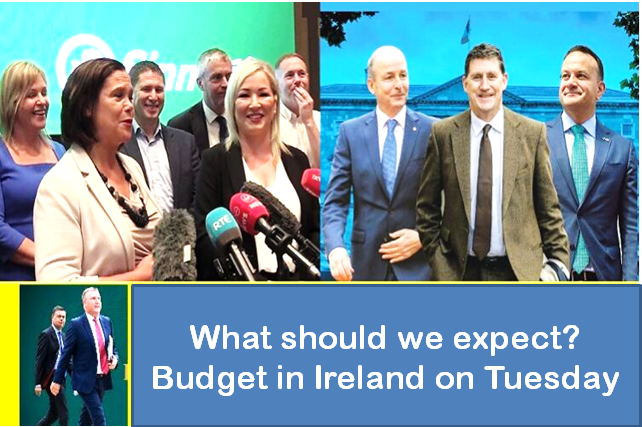Dublin: Dublin is currently witnessing a growing sense of frustration among its youth, who are increasingly finding it untenable to continue living with their parents, particularly if they are over the age of 25 or already married. In recent years, the aspirations of young people in Ireland have been met with disappointment, as the opportunities for upward mobility into the upper classes remain limited. The dream of homeownership has become increasingly elusive, and many are forced to reside in cities due to the nature of their work.
The prevailing housing crisis has taken centre stage in public discourse, with many attributing the problem to a combination of factors, including government policies, the influence of real estate interests, and challenges in the construction and planning sectors. This crisis has left Ireland’s youth grappling with uncertainty and anxiety about their future.
In their quest for solutions, many young people are turning to opposition parties such as Sinn Féin, hoping that they can address these pressing issues. However, there is a prevailing apprehension that even the alternative budget proposed by Sinn Féin has fallen short on a global scale, raising concerns that Ireland may find itself in a situation akin to that of Indian villagers who entrusted the management of cooperative banks to politicians.
With limited alternatives at hand, the ruling party appears poised to secure a political win by solidifying its support among voters who rely on Sinn Féin for solutions. The annual budget is traditionally an opportunity for the government to communicate directly with the public, showcasing the nation’s economic strength and striving to deliver tangible benefits to ordinary citizens. However, the current housing crisis has cast a shadow over these efforts, leaving many young people disillusioned about their prospects in Ireland.
Total required: 100 billion Euros
Ireland is facing a substantial financial commitment for the upcoming year, with an estimated total expenditure of around €100 billion. This sum encompasses both current operational expenses and capital investments in infrastructure and building materials. To put this figure into perspective, last year’s government-approved expenditure amounted to approximately €90 billion, and the upcoming year’s additional spending will push it to the significant milestone of €100 billion.
Salaries and pensions: €28 billion
A substantial portion of this budget is allocated to salaries and pensions, totaling €28 billion for public sector employees in the current year. As is customary, this category represents one of the most substantial portions of the budget, and it is poised to rise further in the coming year as the number of employees in both sectors continues to grow. In the current year, the salary budget has experienced a 3.5 percent increase, while the pension budget has seen a 5.4 percent increase.
Furthermore, there is the potential for a new public sector pay agreement to be reached by the end of the current year or early in the next. Such an agreement, if realised, would lead to additional increases in public sector spending. It is worth noting that the Department of Public Expenditure estimates that each 1 percent increase in pay for public servants translates to an approximate €250 million increase in the overall pay bill.
Large amounts: €25 billion, €23 billion, €14 billion
This year, €25 billion will be spent on health and disability services and €23 billion on social welfare payments, including unemployment benefits, old-age pensions, disability payments, child benefits, etc. The next largest area of expenditure is education (at all levels), where the state spends around €14 billion.
Taxes: €90 billion
This is the amount the state is expected to collect this year in taxes. The largest is income tax, which raised nearly €30 billion last year. For the first time, corporation tax raised €23 billion, an increase of almost 50 percent compared to the previous year.
Corporation tax has been consistently below expectations for the past two months, and the big fear is that it will start to decline. VAT raised nearly €19 billion last year.
National debt: 225 billion euros
Despite this, the national debt is not low. Every man, woman, and child in the country owes 44,000 euros. The official explanation is that this figure is not as scary as it sounds.
It is decreasing. Moreover, countries are not actually repaying their national debt; they are reducing it by refinancing it. Because of the country’s strong economic growth, Ireland has nothing to fear. That is, re-borrowing, while at the same time reducing the total amount of debt due to repayment.
In the forthcoming budget, a pivotal decision revolves around the allocation of a significant €10 billion. This financial package, set to be unveiled on Tuesday’s Budget Day, encompasses a spectrum of initiatives, including annual spending increments, tax reductions, and more. Additionally, there is a noteworthy surplus of €10 billion expected from corporation tax revenue.
It is noteworthy that the government accrued a substantial sum of €61.4 billion from corporation tax receipts. This particular revenue stream stands as a formidable financial bulwark, capable of providing Ireland with resilience in the face of potential economic challenges. A prevailing perception exists that should political parties, including Sinn Féin, come into power, they may adopt a more stringent stance towards large corporations.
It’s imperative to acknowledge that Ireland, often referred to as the “sick man of Europe” historically, has undergone a significant transformation over the past few decades, largely owing to foreign corporate investment and the establishment of corporate headquarters in the country. Consequently, there is an expectation that this year’s budget will include measures aimed at supporting and uplifting the segments of the population that have lagged behind, thus ensuring that the benefits of economic growth extend to all.
Irish Samachar English News
Kindly click the link below to join WhatsApp group chat to get important news and breaking news from Irish Samachar.


Comments are closed.